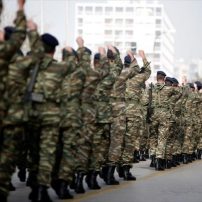
He wanted to save him but he ended killing him
JUDGMENT
Stomatii v. the Democracy of Moldova and Russia 18.09.2018 (no. 69528/10)
SUMMARY
Death due to a soldier’s negligence. The soldier in his attempt to save an armed guard from suicide shot him by mistake twice. The responsible soldier was convicted, but the victim’s mother’s damages actions were not successful. Violation of the right to life.
PROVISIONS
Article 2
Article 13
PRINCIPAL FACTS
The applicant, Svetlana Somatii, is a Ukrainian national who was born in 1963 and lives in Vărăncău
(Transdniestrian region of the Republic of Moldova).
The case concerned the death of the applicant’s son, Alexander Stomatii, while he was on guard duty
during his compulsory military service in the army of the “Moldavian Republic of Transdniestria”
(“MRT”).
In May 2010 Alexander Stomatii was found lying on the ground, on his back, around 10 p.m., about
five metres from the barracks. The forensic medical examiner concluded that he had died from a
bullet wound to the head – the bullet probably having been fired from a Kalashnikov – and another
bullet wound in the back. One month later the “MRT” military prosecutor informed Mrs Somatii that
the investigation had revealed that her son’s death had been the result of imprudent actions by
conscript F., who had confessed. According to F., Alexander Somatii had been drunk while on guard
duty and in the presence of other soldiers had pointed his weapon at his chin. F. had then tried to
deflect the gun but accidentally pressed the trigger, thus causing the death of Alexander Somatii.
Two to three minutes later, F. had decided to move the gun, which was on the ground, but in
mishandling it he had fired another bullet which struck the victim in the back.
In March 2011, F., on trial for manslaughter, was found guilty of that charge and sentenced to two
years’ imprisonment. The sentence was upheld by the “MRT” Supreme Court in May 2011. F. was,
however, discharged from serving it under an amnesty law.
The complaints filed by Mrs Somatii with the Moldovan and Russian authorities were unsuccessful.
The Russian authorities did not reply and the Moldovans suspended the proceedings a number of
times on the ground that nobody who could be charged had been identified.
Relying in particular on Article 2 (right to life), Mrs Somatii complained about her son’s death and
the investigation into the circumstances of his death.
THE DECISION OF THE COURT
Violation of Article 2 (investigation) by Russia
The Court reiterates that the obligation to protect the right to life imposed by Article 2 of the Convention requires that an effective investigation be carried out when a person loses his life in suspicious circumstances.
The effectiveness of the research is assessed on the basis of several essential parameters: the adequacy of the research measures, the speed of the research, and the involvement of the deceased’s relatives in the research and the independence of research.
In this case, the Court notes that Alexander Stomatii died at a military camp during his compulsory military service and that he had two bullet wounds.
The Court considers that the reconstruction of events involving Soldier F. could provide answers, but the Transdniestrian authorities never made such reconstruction. It therefore finds that the findings of the investigation were not based on a thorough, objective and impartial analysis of all the relevant elements and considers that the investigation in this case was not sufficient.
It therefore finds that there has been a violation of the procedural aspect of Article 2 of the Convention.
Violation of Article 2 (right to life) by Russia
According to the case-law of the Court, where such facts, in whole or in part, fall within the exclusive competence and knowledge of the authorities, as in the case of the persons under their control or under their custody, any personal injury or death caused during this period leads to strong de facto evidence. The burden of proof lies within the authorities, which must provide a satisfactory and convincing explanation.
The Court is of the opinion that the Transnistrian authorities did not provide a satisfactory and convincing explanation for the circumstances surrounding the applicant’s death.
Even if the theory regarding the accident is reasonable and reliable, the Court notes that, according to eyewitnesses, Alexander Stomatii and other soldiers, including the main suspect, had consumed alcohol just before the tragic incident. The Court considers that the apparent alcohol consumption of soldiers in the military camps and the possibility of a drunken soldier standing guard, armed with a gun, reveals a clear lack of vigilance and diligence on behalf of the military administration, whose responsibility was to take practical measures regarding effective protection against known risks associated with military life. The Court also notes that the Member States have not shown in any way that the Transnistrian authorities have sufficient procedures to identify deficiencies and misconduct in this case by military personnel.
In the light of the above, the Court finds that there has been a violation of the substantive aspect of Article 2 of the Convention as regards the applicant’s son.
No violation of Article 2 by the Republic of Moldova
The Moldovan Public Prosecutor’s Office initiated a criminal investigation following the complaints made by the applicants concerning the death of Alexander Stomatii, but also undertook the necessary procedural steps that seemed to be required. Indeed, he examined the applicant and repeatedly, but in vain, asked the Transnistrian authorities to provide her with information about the case.
In the light of the above, the Court finds that the Republic of Moldova has not breached its positive obligations with regard to the applicant’s son and that there has been no violation of Article 2 of the Convention by that State.
Just satisfaction: The Court held that Russia was to pay Ms Somatii EUR 50,000 for non-pecuniary
damage and EUR 3,000 for costs and expenses(echrcaselaw.com editing).


